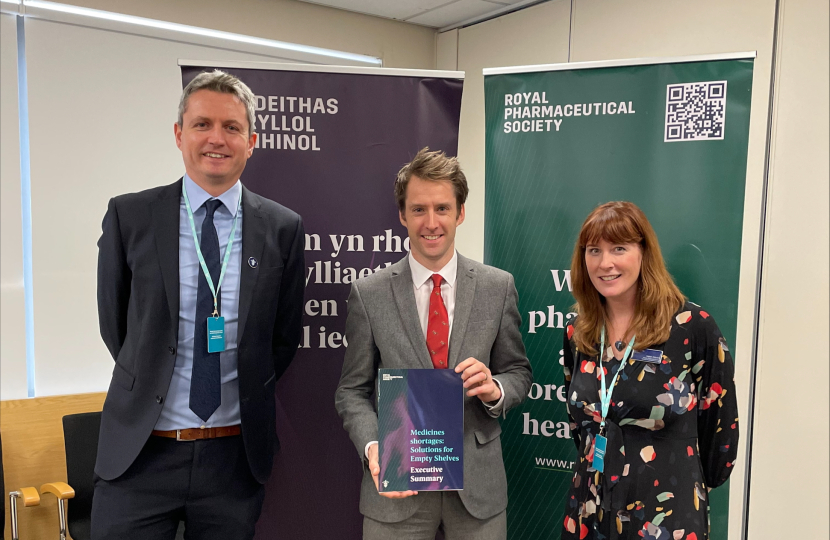
Sam Rowlands, Member of the Welsh Parliament for North Wales, expresses concern over the impact of medicine shortages on patient care.
Mr Rowlands, Shadow Health Minister recently joined fellow members in the Senedd at an event organised by the Royal Pharmaceutical Society to discuss their report Medicines shortages: Solutions for empty shelves.
I was pleased to be able to meet with representatives from the Royal Pharmaceutical Society and discuss the report with Alwyn Fortune, Policy Lead RPS Wales.
It was very concerning to hear about the impact of medicine shortages and how there is growing concern on the affect this will have on patient care in the UK and around the world.
It clearly is a problem and I fully support the aims of the report which calls for more to be done to address the issue and ensure that this does not put added pressure on our already struggling NHS.
The new report Medicines shortages: Solutions for empty shelves was launched at the House of Commons last month, followed by briefing events in Scotland and then in the Senedd.
The report from RPS provides a comprehensive assessment of what is causing medicines shortages, their impact on patients, pharmacists and healthcare professionals, and what more can be done to mitigate and manage medicines shortages.
While national systems have historically mitigated the impact shortages have had on patients, mounting pressures mean that further action is needed. Shortages are increasingly affecting patient care and healthcare teams, underscoring the need to invest in and strengthen the systems in place.
The increasing burden of medicines shortages places significant pressure on healthcare professionals, especially pharmacy teams, leading to higher workloads, strained professional relationships and mental health concerns.
Medicines shortages affect other areas of the health and social care workforce, with prescribers needing to see patients multiple times, referred to them for alternative prescriptions when their regular medicines are not in stock. In hospitals, specialists see patients who cannot be treated in primary care because medicines are unavailable or in short supply.
Sam Rowlands AS yn tynnu sylw at broblemau gyda phrinder meddyginiaethau
Mae Sam Rowlands, Aelod o’r Senedd dros y Gogledd, wedi mynegi pryder am effaith prinder meddyginiaeth ar ofal cleifion.
Ymunodd Mr Rowlands, Gweinidog Iechyd yr Wrthblaid dros y Ceidwadwyr Cymreig, â chyd-aelodau yn y Senedd yn ddiweddar mewn digwyddiad a drefnwyd gan y Gymdeithas Fferyllol Frenhinol i drafod eu hadroddiad Medicines shortages: Solutions for empty shelves.
Roeddwn i’n falch o allu cwrdd â chynrychiolwyr o'r Gymdeithas Fferyllol Frenhinol a thrafod yr adroddiad gydag Alwyn Fortune, Arweinydd Polisi Cymdeithas Fferyllol Frenhinol ar gyfer Cymru.
Roedd yn destun pryder mawr clywed am effaith prinder meddyginiaeth a’r pryder cynyddol am yr effaith y bydd hyn yn ei chael ar ofal cleifion yn y DU ac ar draws y byd.
Mae'n amlwg yn broblem ac rwy'n cefnogi nodau'r adroddiad yn llawn. Mae’n galw am wneud mwy i fynd i'r afael â'r mater a sicrhau nad yw hyn yn rhoi pwysau ychwanegol ar y GIG sydd eisoes yn ei chael hi'n anodd.
Cafodd yr adroddiad newydd, Medicines shortages: Solutions for empty shelves, ei lansio yn Nhŷ'r Cyffredin fis diwethaf, ac yna mewn digwyddiadau briffio yn yr Alban ac yna yn y Senedd.
Mae'r adroddiad gan y Gymdeithas Fferyllol Frenhinol yn darparu asesiad cynhwysfawr o'r hyn sy'n achosi prinder meddyginiaethau, yr effaith ar gleifion, fferyllwyr a gweithwyr gofal iechyd proffesiynol, a beth arall y gellir ei wneud i liniaru a rheoli prinder meddyginiaethau.
Er bod systemau cenedlaethol wedi lliniaru'r effaith y mae prinder meddyginiaeth wedi'i chael ar gleifion yn hanesyddol, mae pwysau cynyddol yn golygu bod angen gweithredu pellach. Mae prinderau fel hyn yn effeithio'n gynyddol ar dimau gofal cleifion a gofal iechyd, gan danlinellu'r angen i fuddsoddi yn y systemau sydd ar waith a'u cryfhau.
Mae baich cynyddol prinder meddyginiaethau yn rhoi pwysau sylweddol ar weithwyr gofal iechyd proffesiynol, yn enwedig timau fferylliaeth, gan arwain at lwyth gwaith uwch, straen ar gysylltiadau proffesiynol a phryderon iechyd meddwl.
Mae prinder meddyginiaethau yn effeithio ar rannau eraill o'r gweithlu iechyd a gofal cymdeithasol, gyda phresgripsiynwyr angen gweld cleifion sawl gwaith, gan eu bod yn cael eu cyfeirio atyn nhw am bresgripsiynau amgen pan nad yw eu meddyginiaethau rheolaidd mewn stoc. Mewn ysbytai, mae arbenigwyr yn gweld cleifion na ellir eu trin mewn gofal sylfaenol oherwydd nad yw meddyginiaethau ar gael neu nad oes llawer ohonyn nhw ar gael.

